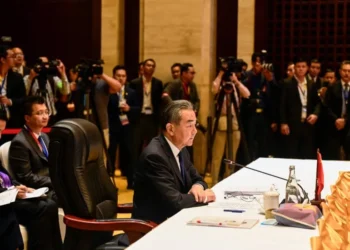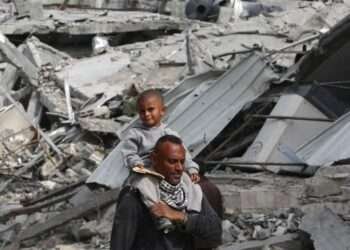For the third time start of the war, the U.S has vetoed Gaza ceasefire proposals at the UN Security Council (UNSC).
Although 13 out of 15 members supported it, the U.S with its single power of veto sunk the resolution.
The U.S has consistently shielded Israel from diplomatic pressure at the UN since the war began, vetoing resolutions calling for a ceasefire despite overwhelming support from UN member states.
The U.S is also Israel’s primary supplier of arms.
The consequences of the latest U.S veto, which stands as a stark barrier to the collective will of the international community, ripple far beyond the walls of the Security Council chambers, impacting the lives of innocent civilians who continue to bear the brunt of violence.
In recent weeks, the Security Council has grappled with resolutions aimed at bringing an end to the hostilities, delivering humanitarian aid, and addressing concerns raised by the International Court of Justice (ICJ) regarding potential acts of genocide.
Yet, despite overwhelming global support, the U.S. has cast its veto, stalling progress and leaving many to question the role of the superpower in international peacemaking efforts.
The Security Council, designed to be a forum for global cooperation and conflict resolution, is now ensnared in a deadlock that prolongs the suffering of innocent civilians.
The UNSC is the only UN body with authority to issue resolutions that are binding on member states.
The veto undermines the very essence of the Security Council’s mandate; to maintain international peace and security, and raises questions about the efficacy of the international diplomatic framework.
Proponents of the U.S. position may argue that the veto is wielded in defense of strategic interests or to prevent resolutions that may be perceived as one-sided.
However, the dire humanitarian situation in Gaza, coupled with reports of widespread civilian casualties, beckons the international community to rise above political considerations and prioritize the preservation of human life.
The repeated use of the veto by the U.S. also puts into question the broader dynamics of power within the Security Council.
As one of the five permanent members with veto power, the U.S. carries immense influence, but with that influence comes a weighty responsibility to contribute to global peace and stability.
Imagine a convoy of hope navigating the dusty roads of a region ravaged by conflict, only to be met with gunfire and attacks.
This is the harsh reality that aid workers are facing in northern Gaza.
The World Food Programme (WFP), despite a three-week suspension, attempted to resume deliveries on Sunday, February 18, 2024, but the unfolding scene was nothing short of pandemonium – a vivid testament to the desperate circumstances that have befallen the region.
As such, the WFP, the UN’s food agency, announced its decision to pause deliveries of aid to northern Gaza despite widespread hunger after a convoy of trucks faced gunfire and attacks.
The WFP cited security risks and the “breakdown of social order” as the reasons behind its decision.
The WFP said that the decision “has not been taken lightly.”
“As we know, it means the situation there will deteriorate further and more people risk dying of hunger,” it said, adding that it will resume deliveries “as soon as possible.”
To be able to resume deliveries, it said, “significantly higher volumes of food” need to be allowed into the Gaza Strip from “multiple routes.”
“A functioning humanitarian notification system and a stable communication network are needed. And security, for our staff and partners as well as for the people we serve, must be facilitated.”
World Food Programme
A Death Sentence
Gaza’s Government Media Office decried the UN World Food Programme’s decision to suspend deliveries to northern Gaza, where the security situation is deteriorating.
The office said the move “would mean a death sentence for three-quarters of a million people” and will “exponentially worsen the humanitarian situation.”
“We urge all UN agencies to return to the governorates of Gaza and North Gaza immediately and without hesitation instead of complacency and escaping responsibility,” the local authorities said.
They added that the UN would be responsible for the “catastrophic consequences” of famine in the territory.





















